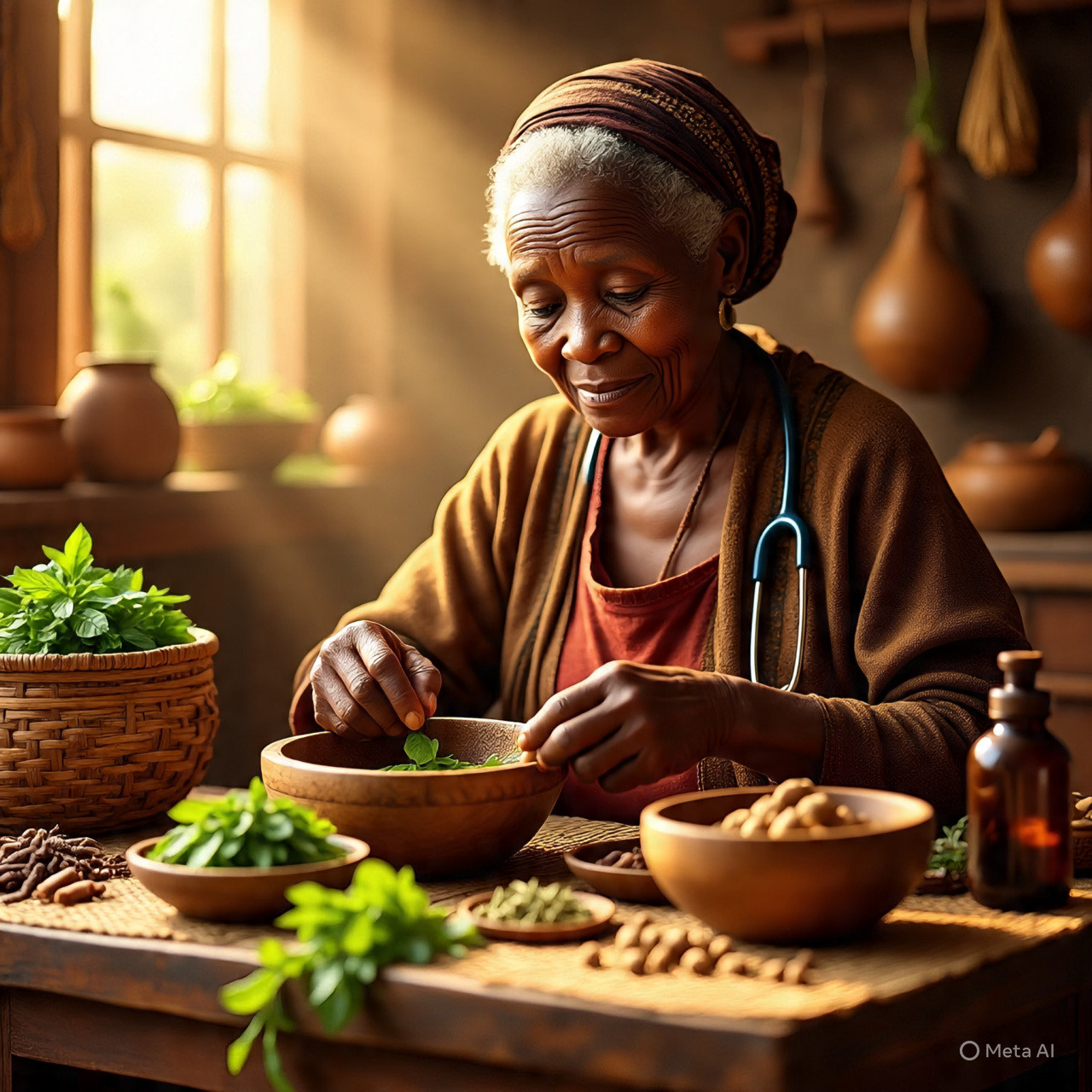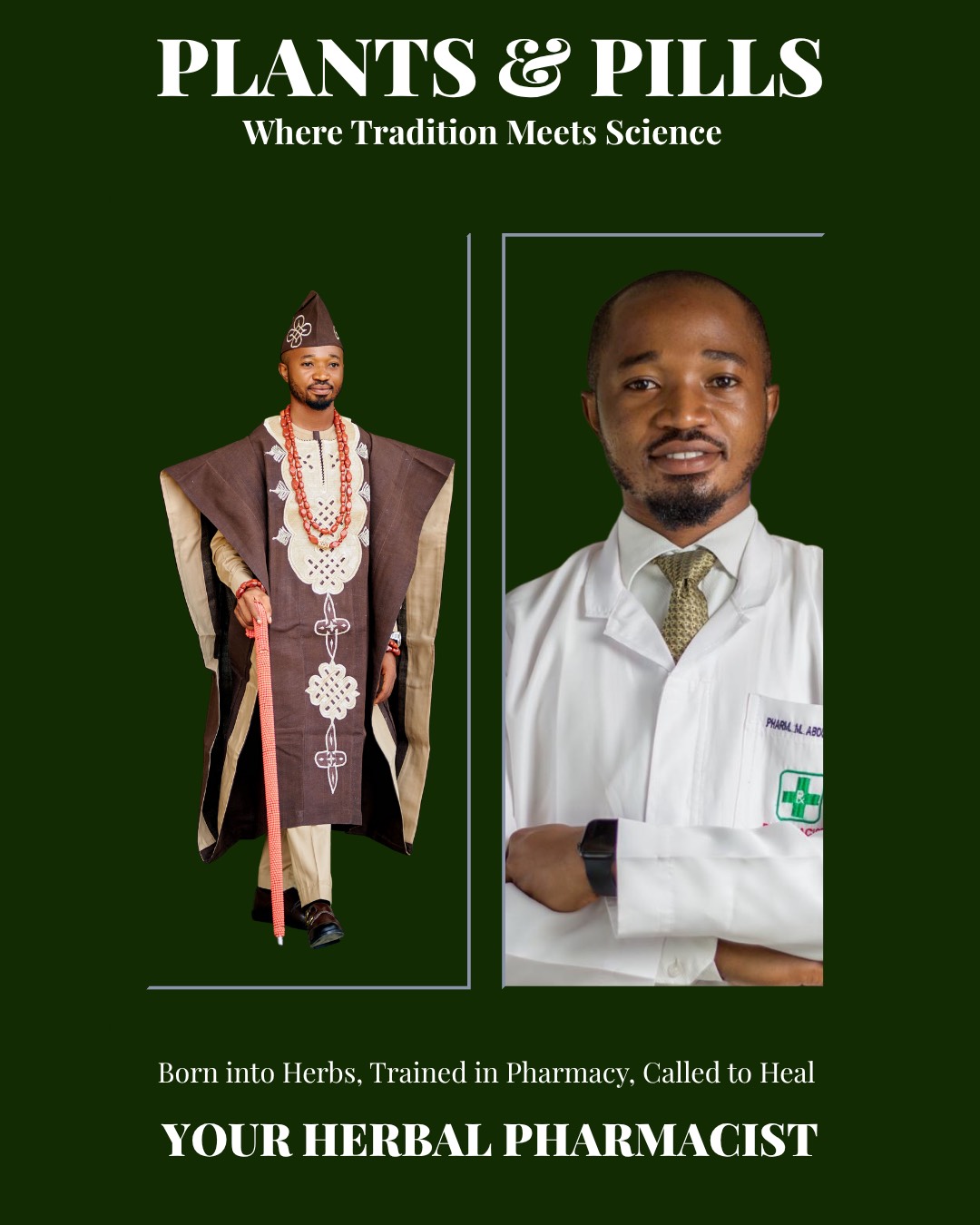Currently Empty: ₦0.00

The Pharmacy in Grandma’s Kitchen
I remember sitting in my grandmother’s kitchen, watching her crush bitter kola in a small wooden mortar, mix it with honey, and hand it to an uncle complaining of a stubborn cough. The smell of fresh lemongrass boiling in a pot filled the air, as she hummed a tune I didn’t know the meaning of.
She didn’t wear a lab coat. She had never attended pharmacy school. But she dispensed medicine every single day. Not in bottles with printed labels, but in calabashes, cups, and steaming bowls.
If you grew up in Nigeria, you’ve probably seen the same scene. In many homes, especially in rural areas, it was the grandmother who “prescribed” the herbal tea for fever, knew the right leaves for malaria, and forbade certain foods when a child was sick.
Long before we had pharmacies on every corner, we had grandmothers and in their own way, they were pharmacists.
The Role of the Community Healer
In traditional African societies, healthcare was not centralized in hospitals or clinics. It lived in the community. Women, especially grandmothers and elder mothers were the custodians of herbal knowledge.
They knew:
-
Which leaves to pluck for stomach aches
-
How to combine roots for fever
-
What seeds could aid digestion
-
Which plants to avoid in pregnancy
-
How to use prayer, song, and herbs together for spiritual comfort
They were midwives, nurses, pharmacists, and counselors rolled into one. Their work was guided not by textbooks, but by observation, oral tradition, and cultural experience passed down for generations.
Traditional Knowledge Transfer
Grandmothers didn’t read medical journals. Their classrooms were the farms, the markets, and the family compound. Knowledge was passed down like a family heirloom:
-
A mother teaching her daughter the taste of a medicinal leaf
-
An elder correcting a young herbalist’s preparation method
Community elders deciding which plant should never be harvested before dawn.
This knowledge transfer was highly localized. A Yoruba grandmother in Oyo might know remedies different from an Igbo grandmother in Enugu, based on local plants and cultural beliefs.
Overlap with Modern Pharmacy
Here’s the fascinating part, many of the remedies your grandmother used have direct scientific parallels in modern pharmacy:
-
Bitter leaf (Vernonia amygdalina) → Known to have anti-malarial and blood sugar-lowering properties
-
Ginger (Zingiber officinale) → Used in modern anti-nausea drugs
-
Aloe vera → Found in skin healing creams and digestive supplements
-
Willow bark (less common in Nigeria) → Source of salicylic acid, the base for aspirin
The difference is modern medicine isolates the active compound, tests it in controlled conditions, determines the dose, and regulates its use. Grandma’s pharmacy was based on observation and accumulated wisdom but without the precision of dosage, which could sometimes mean under-treatment or overuse.
Where It Went Wrong
As Nigeria modernized, urbanization and Western education began to shift the center of healthcare away from the home and into hospitals and pharmacies. This had benefits, improved access to life-saving drugs, standardized care, and scientific testing.
But it also had consequences:
-
Much indigenous knowledge was lost because it was never documented
-
Younger generations became disconnected from herbal traditions
-
Unsafe practices persisted among those without proper guidance
-
Herbal remedies became commercialized without regulation, leading to abuse and mistrust
In some cases, herbal medicine began to be viewed as “backward” something for rural dwellers, while modern medicine was seen as “superior.” This division was never meant to exist.
The Case for Preservation
Losing grandmother’s knowledge means losing part of our health identity. It means losing potentially life-saving remedies hidden in plain sight in our forests and gardens.
The World Health Organization recognizes traditional medicine as a valuable healthcare resource. But for it to serve us today, we must:
-
-
Document: Record recipes, uses, and cultural practices before they vanish
-
Research: Test herbs scientifically for safety and effectiveness
-
Educate: Teach both the public and healthcare workers about safe herbal integration
-
Regulate: Ensure that herbal products meet quality and safety standards
Integration as the Future
The future is not about choosing between grandmother’s bitter leaf soup and the pharmacist’s capsule. It’s about respecting both.
Imagine a Nigeria where:
-
Hospitals have a herbal department
-
Pharmacists are trained in both modern and indigenous medicine
-
Herbalists are licensed and recognized as part of the healthcare system
-
Patients can talk about herbs with their doctors without fear of judgment
Grandmother’s wisdom should be the foundation we build upon, not something we leave behind.
Your grandmother was a pharmacist, she just didn’t know it. She worked without a license but with deep care for her family and community. She was a custodian of knowledge that could save lives today if only we protect it.
As “Your Herbal Pharmacist,” my mission is to preserve this wisdom, refine it with science, and make it safe for every Nigerian household.
Because healing is not about the past or the future, it’s about both, working together.
Let’s honor our grandmothers by keeping their pharmacy alive, safely and proudly.
📌 Written by Pharm. Mubarak Okikiolamilekan Abdulsalam
Founder, Plants and Pills | Herbal Pharmacist | Integrative Medicine Advocate



